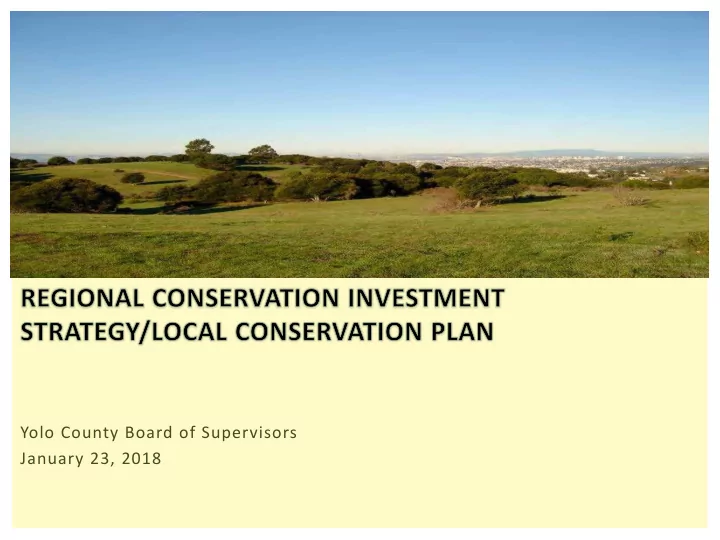

Yolo County Board of Supervisors January 23, 2018
AB 2087 – Establishes goals and content of an RCIS Regional Enables Mitigation Credit Agreements (MCA) Conservation Investment Outlines process for obtaining MCAs when entities Strategies invest in conservation consistent with an RCIS Provides assurances that state and local agencies can get credit for advance mitigation planning investments Creates framework for voluntary, philanthrophic conservation efforts
LOCAL CONSERVATION PLAN Not part of the RCIS statute—an outgrowth of the HCP/NCCP Voluntary, non-regulatory conservation framework for species and habitat types of local concern in Yolo County and adjacent areas Allows local, state, and federal agencies and concerned citizens to evaluate conservation opportunities in the county Allow private landowners to benefit from and better understand the conservation value of their lands in a regional context Justify fundraising (e.g., grants, federal assistance ) for landowners for voluntary conservation projects (e.g. pond maintenance).
RCIS PROJECT TEAM AND ENGAGEMENT: STEERING COMMITTEE Core Team Additional Members • Yolo County • Representative from • Yolo Habitat Conservancy Advisory Committee • Department of Water • American Rivers Resources • Environment Defense Fund • The Resources Agency • ICF • Conservation Strategy Group
YOLO RCIS/LCP PROJECT TEAM AND ENGAGEMENT: ADVISORY COMMITTEE Members and Alternates Steve Greco, Environment Steve Thompson, Landowner Glen Holstein, Environment Charles Tyson, Landowner John Hopkins, Environment Jeanette Wrysinski, Agriculture Kent Lang, Agriculture John Brennan, Landowner Chad Roberts, Environment Bonnie Chiu, Development Michelle Azavedo, Development
RCIS OVERVIEW • Voluntary, non-regulatory • Non-binding on land use authorities • Proposed by any public agency • Good for up to ten years • Can be extended, updated or amended • RCIS required for MCAs including species & other elements to be in MCA
What is the County interest in the RCIS/LCP? Consideration and accommodation of local agricultural sustainability and land use policies in the RCIS planning process Coordinated mitigation for local projects—including those that are not covered by the HCP/NCCP (e.g., endangered, threatened, and rare fish species) Allows the County to support private conservation efforts by creating a plan that could serve as the foundation for compatible grant applications
RCIS COMPONENTS • 41 “focal species that are state/federally listed or may become listed 72 “conservation species” = other species of local concern • • Summary of mitigation banks in RCIS Area • Consider working lands conservation—multi-benefit projects Identify conservation & enhancement actions •
POTENTIAL CONSERVATION & ENHANCEMENT ACTIONS • Acquire and protect land • Restore creeks and rivers Restore habitat on public land • Install wildlife crossings • • Remove fish barriers • Create/restore rearing habitat
MITIGATION CREDIT AGREEMENT OVERVIEW • Anyone may apply for an MCA • Based on conservation & habitat enhancement actions in an approved RCIS Consistent with CDFW’s Banking Program • • NCCP Implementing Entity approval required (a big deal) • Not allowed for Delta water conveyance facilities
MCA ENABLES: Advance mitigation • • Transferrable credits • Excess project conservation & enhancements used as credits • Offset impacts under CESA, CEQA, LSA Offset permanent and • temporary impacts • On public or private land
EXAMPLE– FLOOD CONTROL = sensitive habitat/resource RCA Setback Levee MCA RCIS
REMAINING YOLO RCIS/LCP STEPS & ISSUES Procedural Steps • Submission of administrative draft to CDFW • 30+ day adequacy review • Plan updated to address CDFW comments (+ others) • 30+ day public review and comment period • Final revisions and County action (presumably, to approve) • Submission to CDFW for approval Substantive issues • Implementation—who, how, with what funding? • County role in implementation of MCAs (if out-of-county mitigation allowed via RCIS and MCA)
RECOMMENDED ACTIONS • Authorize submission of administrative draft to CDFW • Direct staff to: • Continue supporting Yolo Habitat Conservancy in efforts to define and identify funding for meaningful implementation • Evaluate need to amend Habitat Mitigation Ordinance to capture MCAs with out-of-county “service area” • Report back to Board on implementation and out-of- county mitigation issues prior to final County action
Recommend
More recommend